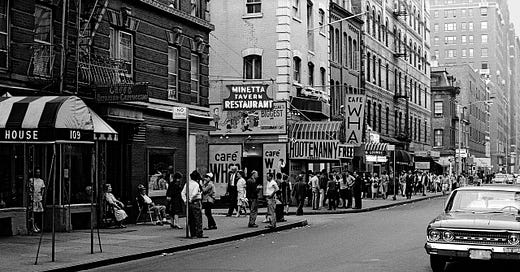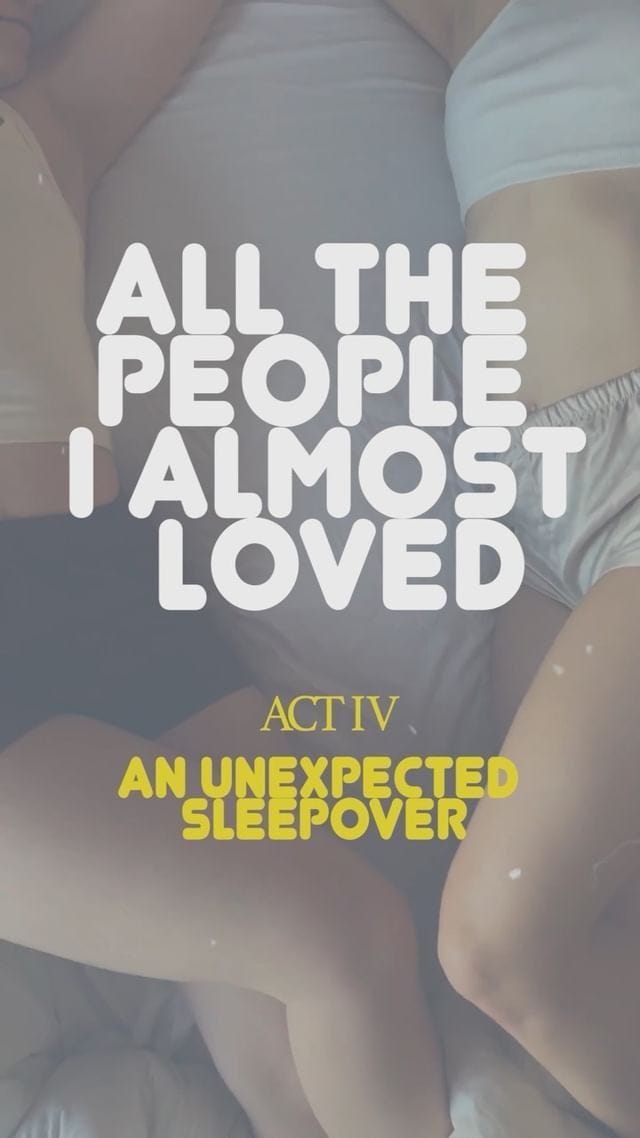Edition #103: The Men of the Morning
The women make Euphoria, if everything is trauma, is anything, and a commune
Note From the Editor
If you’ve ever visited New York City, you’ve likely strolled along MacDougal Street—home to a famous comedy club, an iconic fine-dining institution, a cafe that claims to have invented cappuccino, a handful of assorted dessert shops that regularly blow up on TikTok, a tavern allegedly frequented by famous writers in the ’80s, and a mindblowing number of hole-in-the-wall restaurants. It also happens to be the street I live on, and it is utter pandemonium.
Every night, a cast of characters work in harmony to destroy the small stretch of street between Bleecker and West 3rd—a rare, inspiring feat of New Yorkers coming together for a common goal. NYU students toss beer cans on the ground, tipsy tourists stumble out of jazz clubs and dispose of aluminum crepe containers (also on the ground), crypto bros fling Juul pods into gutters. Stealth drug dealers, suited-up business people, disgruntled homeless people, and the Gen Z skateboarders all do their part to leave a personal trail of breadcrumbs on the street each night, signs of life and debauchery. Sometimes, the chaos lasts until 3 or 4 am. After, there is a brief interlude—I’m asleep for this, but I imagine it is a glorious moment of silence, like when a screaming toddler finally goes down for a nap—and then, promptly at 6 am, the Bob Marley song begins to play.
I distinctly remember the first morning I heard it. I was furious because it woke me up, grumpy because the noise on the street had kept me awake the night before, and intrigued because the same song was playing over and over, repeated at least six times in a row. I opened my window, the sky still dark, and crawled out to my fifth-floor fire escape. Across the street, I identified the source of the noise—a small Bluetooth speaker, strapped to the belt of the man who swept the sidewalk. I watched as he plucked a variety of trash from the gutter with gloved hands, swept, sprayed the sidewalk, and swayed to the beat. I was moved by a deep feeling of kinship with him, for I, too, listen to the same song on repeat while cleaning, and also to the point of mania.
The next day, I took an early morning yoga class. I left my apartment before the sun and on the walk, I passed the man from the morning before. There were two men, three, five, seven. There was a man for every establishment, each in varying states of clean-up. This one hosing off the sidewalk, that one sweeping, this one unloading boxes. I watched the men clean up our disgusting messes and thought about the relentlessness of it. How every evening there would be chicken bones littering the ground, oozing pizza boxes and crushed cups, and how every morning these men would be there to clean it up just so it could get dirty again a few hours later.
Everywhere we look, the ghost of invisible labor lingers. We know this, yet it’s all too easy to ignore when we don’t see it and when it doesn’t have any direct impact on our lives. Imagine we had to watch 10 seconds of footage of retirees hauling massive Amazon boxes in depressing-looking warehouses before clicking to purchase—I bet that would curb our shopping habits a tad. The sad truth is everything we consume and purchase likely has dirty origins that would make us feel horrible if we knew the truth of it. I once read that there was no ethical way to buy shrimp. Because virtually all of our shrimp is imported from factory farms in Thailand, and because those farms have little to no regulation, practically every bite of shrimp we consume has, at some point in the supply chain, been touched by the hands of slave labor. I know what you’re thinking: “Shrimp? Please leave me alone. Things are already bleak enough as it is.”
To that I say, I know and I’m sorry. It’s not our fault that we were born in a rich, exploitative country powered by capitalism, and feeling guilty about every last thing we purchase and consume gets us nowhere. On the other hand, I do think it is useful to notice and acknowledge the fact that somebody is doing the physical labor needed to enable us to do and eat and buy all of the things we like to do and eat and buy. There is no magic street sweeper that scrubs down MacDougal Street every morning, but there is a group of men with Bluetooth speakers and brooms.
Earlier this year, I spent a few Sundays in a row volunteering at one of my favorite places in the city, Xavier Mission. Most shelters are closed Sundays, so Xavier runs a lunch that serves about 1,300 hot meals in the span of a few hours. In the past, I had worked as the coffee girl, a job that was fun and easy—pour coffee, smile, chat people up. Everybody loves the coffee girl. This time, however, they were severely short-staffed because of the holiday and the booster requirements. I was put on packing and running duty, which entailed stuffing a hot meal, a veggie, and a dessert into brow paper bags, sealing the bags in larger plastic bags, loading up my forearms with said bags, and walking them out, up a set of stairs, and to the long line on the street.
It went like this for three hours. Every time I glanced up at the monstrous cafeteria I saw a sea of empty brown bags, waiting to be stuffed by me. Every time I loaded up both of my arms with filled bags—starting with six or seven at a time, ramping up to nearly 20 by the end of the day—and dropped them to the street, I saw a long line of hungry people wrapped around the building. I got into a sort of trance, my feet moving as quickly as they could, my arms carrying as much weight as they could bear. I didn’t stop once for the entire three hours, not even for a sip of water or a bathroom break. There was nothing heroic about the pace, it was simply what the situation called for because the meal was busy and people were hungry and we were short of bodies. Everybody worked fast and quiet.
There was one point when I stopped to check in with my body. My forehead was sheen with sweat, the backs of my knees ached, and my forearms were red and raw from where the plastic bags strained against them. At that moment, I wondered whether this was the most I could do to help people. Physical labor, the packing, and the running. I had other skill sets, surely I could put them to better use to make a larger impact, right? I questioned whether this was the best use of my time in the grand scheme of things, for this meal service was simply plugging a hole in a sinking ship. It wasn’t rebuilding the ship with better material, and shouldn’t I want to rebuild the ship? To fix the broken foundation?
When I continued to ponder that question later, from the comfort of my couch while massaging the soles of my sore feet, I realized that the labor I performed that day is what is required. To feed people, to plug the holes, and to meet the immediate needs of those who are seeking support, there are hundreds of paper bags that need to be stuffed with hot food. There would always be hundred of paper bags. I decided right then that such labor was the best use of my time and that it would always be a good use of my time because if I didn’t do it, there would still be bodies needed to get it done. It’s easier to say that we’ll help somebody someday, that we’ll run for office or donate or make bigger contributions that might technically have a larger impact in the long haul. In the interim, though, somebody is stuffing paper bags, cooking soup, sweeping the streets. And I don’t think I should feel above any of those tasks if I expect others to do them on my behalf. Those tasks are what is required to keep our comfortable lives comfortable, but also, to plug the many holes in our broken systems. It’s better to plug a hole now, to get my hands dirty with a small portion of the physical work that keeps our world spinning on its axis than to hold off for the sake of doing something “bigger”, “someday”. It takes a village, as they say.
Cheers, my dears, and as always, thanks for reading. If you liked today’s edition, please consider becoming a paying subscriber. Paid subscriptions make it possible for me to continue to pour time and energy into this precious newsletter. I hope you’ll consider it!
And, if something sparked your interest in today’s edition, please share it with a friend / loved one. After sharing, discuss whatever topic you found interesting! Less talking about Ye and more talking about…anything else.
Three Pieces of Content Worth Consuming
The Women Make Euphoria. I historically haven't been a big TV watcher, but something I've learned recently from attempting to be more immersed in the pop-culture TV lexicon is that I favor shows that are heavy, dramatic, and emotionally draining. No The Office wanted here; give me the full-body panic that is Euphoria. Season Two has been frustrating and satisfying, and I only clicked this article for the photos but I got so much more out of it. It's interesting to see how the characters and actors have influenced the storylines, how they cope with playing such emotionally tolling roles, and to learn that the actress who plays Maddy is the only one of the bunch who was relatively unknown before the show premiered (she’s so good!). The styling in these photos is also superb.
If Everything is ‘Trauma’, Is Anything? This one was especially thought-provoking. Today, we're more online than ever, and the internet has created a new language and an unprecedented speed with which that language is adopted. One of the results: Therapy speak being mass adopted and applied to nearly every situation. We’ve got trauma, love bombing, gaslighting, you name it. An interesting point about the upsides of having the language to identify previously acceptable, but actually unacceptable, behaviors, and on the downsides of overuse in making language less precise. A commentary on what happens when the age of trauma unfolds during the age of social media.
The Common Dating Strategy That’s Totally Wrong. Never have I ever read such a blatantly clickbaity article headline from The Atlantic, but here we are. My favorite part about this one was the suggestion to approach dating the same way you'd approach traveling—embracing the idea that the novelty is exciting and welcome instead of a threat. For those partnered, I'm wondering whether you agree with the sentiment expressed here. Are you and your mate more similar or more different? And if you're single. would you consider dating someone with different political views as you?
Perhaps You Should… Try A Commune
If you haven't been able to tell from recent editions, I have been percolating on the idea of communal living for a minute now. I'm also currently reading a wonderful debut novel about a cult, which is just a commune with more rules. Needless to say, this listing for an "intentional living community in the Catskills perked my interest. I want to stroll barefoot in that grass!
**Bonus Content** (It’s My Series)
On Monday I released the final Act in my short video series, All The People I Almost Loved. It was my first time writing, directing, and producing—you can see the trailer here—and I’m proud of the way the series turned out. If you’ve got some time today, give one of them a watch. My current favorite is this one. Paying subscribers got an email about how we shot each video, but in short, all of the b-roll was shot in a single day on an iPhone, all of the actors were cast by me, and the whole project was done on a >$400 budget. More videos to come later this year!
A Quote From A Book You Should Read:
“I think of how keenly I’ve been wrong. I think of all the gods I have made out of feeble men.”
-Luster by Raven Leilani
This newsletter is best served with a side of conversation, so drop your opinions, reflections, and thoughts in the comments below and let’s get to talking.
Or, share the most thought-provoking piece from today’s edition with someone you love, then call them up to discuss, debate, and percolate. As a wise woman once said, “Great minds discuss ideas.







The love article felt so reductive to me, especially on the topic of politics. I think most people would say that my partner and I compliment each other- we're both outdoorsy but in different ways, we're both artsy but through different mediums, we both love to read but read different genres, etc. When you really dig though, we're super different. I'm an extrovert, he's an introvert. He struggled through school and I excelled. He has no mental illnesses but mine are a burden on both of us. We are different, as are all people. But at the end of the day, our moral compasses are pretty well aligned. I think that's the point this author missed. Your core ideals have to match up.
When my partner and I met, he had voted for McCain in the previous election and I had voted for Obama. It wasn't a make-or-break issue because politics were different then and neither of us were defined by the core values of those candidates. I could, and still do, call out Obama policies I didn't like. He could, and still does, compliment Obama on things he did like. When I say I could never be with someone who voted for Trump, we're not talking, "I think those taxes could be better allocated," politics here, we're talking fundamental human rights stuff.